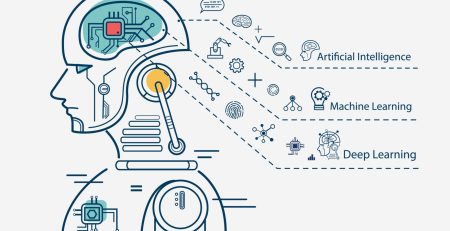Driving Success: Harnessing Artificial Intelligence in Finance
Artificial Intelligence and Its Growing Impact
As we navigate through the digital era, it’s impossible to ignore the transformative power of Artificial Intelligence (AI). From automating mundane tasks to revolutionizing decision-making processes, AI is reshaping the way we live and work. But what exactly is AI and how did it come about?
The Advent of Artificial Intelligence
Artificial Intelligence isn’t a new concept. In fact, the foundations of AI can be traced back to the mid-20th century, when computer scientists began exploring the notion of creating machines that could mimic human intelligence. However, it wasn’t until the last couple of decades, with the advent of advanced computing power and the explosion of data, that AI truly started to take shape.
AI has since permeated various industries, from healthcare to retail, and of course, finance. The application of artificial intelligence in finance has opened up new frontiers in terms of efficiency, accuracy, and strategic decision-making. But before we delve into the specifics, let’s first understand what AI entails.
Understanding Artificial Intelligence
Artificial Intelligence, in its simplest form, refers to the simulation of human intelligence processes by machines, especially computer systems. This involves learning (the acquisition of information and rules for using the information), reasoning (using rules to reach approximate or definite conclusions), and self-correction. For a more in-depth look at AI, you can check out our article on artificial intelligence definition.
AI can be classified into two main types: Narrow AI, which is designed to perform a narrow task (such as facial recognition or voice commands), and General AI, which can perform any intellectual task that a human being can.
While Narrow AI is currently in use in various applications including voice assistants, recommendation systems, and autonomous vehicles, General AI, which would outperform humans at nearly every cognitive task, is still a concept of the future.
In recent years, Machine Learning (ML) and Deep Learning (DL), subsets of AI, have garnered significant attention. ML involves teaching computers to learn from data and improve from experience, while DL, a subfield of ML, uses neural networks with many layers (hence “deep”) to analyze various factors with a structure similar to the human brain. You can learn more about these concepts in our article on artificial intelligence machine learning.
Understanding the fundamentals of AI is crucial, especially for professionals and leaders aiming to leverage artificial intelligence in finance and other sectors for strategic growth. As we journey further into the realms of AI, it is evident that this technology will continue to shape and redefine our future.
Artificial Intelligence in Finance: An Overview
Artificial Intelligence (AI), with its immense potential and transformative power, is making a noticeable impact across various sectors, including finance. Let’s delve into the role and the evolution of artificial intelligence in finance.
The Role of AI in Finance
AI has proven to be a game-changer in redefining how financial institutions operate, enhancing their ability to process information, and making decision-making processes more efficient.
One of the key roles of AI in finance is in data analysis. With the ability to process vast amounts of data at high speed, AI provides insights that were previously unattainable. These insights aid in risk assessment, investment strategies, and market predictions.
AI also plays a crucial role in automating routine tasks. Tasks such as data entry, report generation, and transaction processing, which are time-consuming and prone to errors when done manually, can be automated using AI, freeing up valuable time for staff to focus on more strategic tasks.
Lastly, AI is instrumental in enhancing customer experience in the finance sector. AI-powered chatbots and virtual assistants provide instant customer service, while AI-driven personal finance tools offer tailored financial advice to customers.
The Evolution of AI in the Finance Sector
AI’s journey in the finance sector has been progressive. Initially, AI was used for basic tasks such as data management and customer service. However, with the advancements in AI technology, its role in finance has significantly evolved.
The first wave of AI in finance was characterized by automation of simple computational tasks and basic data analysis. However, the second wave brought about the application of AI in areas such as algorithmic trading, credit scoring, and risk management.
In the current wave, AI is being leveraged for complex tasks like predictive analytics, sentiment analysis, and natural language processing. It’s also being integrated with other advanced technologies like blockchain and machine learning. For a deep dive into the AI and machine learning relationship, visit our blog on artificial intelligence machine learning.
As we move forward, AI’s role in finance is expected to become even more pronounced, driving efficiency, accuracy, and profitability.
To summarize, the integration of artificial intelligence in finance is not just an emerging trend; it’s a powerful tool shaping the future of the finance industry. As AI technology continues to evolve, the finance sector will no doubt continue to reap the benefits of this digital revolution. For more insights on how AI is revolutionizing various sectors, check out our blogs on artificial intelligence in gaming and artificial intelligence in business.
Advantages of Artificial Intelligence in Finance
As the role of artificial intelligence in finance increases, it’s critical that we understand the significant benefits it offers. From improved decision making to enhanced risk management and streamlined operational efficiency, the advantages are numerous and impactful.
Improved Decision Making
One of the most valuable benefits of artificial intelligence in the finance sector is its ability to improve decision-making processes. AI algorithms can analyze vast amounts of data at an unprecedented speed, delivering insights and predictions that humans alone could not achieve. This allows financial professionals to make more informed and strategic decisions, driving better results and greater business success.
For example, AI can help portfolio managers determine the best investments by analyzing market trends, economic indicators, and other relevant data. This results in a more accurate and reliable investment strategy, leading to higher returns and reduced risk.
Enhanced Risk Management
Risk management is a critical aspect of finance, and AI can play a significant role in enhancing these efforts. By leveraging machine learning algorithms, AI can predict potential risks and uncertainties more accurately than traditional methods. This allows businesses to proactively mitigate risks and safeguard their financial health.
AI’s predictive capabilities can also be applied to credit scoring and risk assessment, enabling financial institutions to assess the creditworthiness of applicants more accurately and efficiently. This results in fewer defaults, reducing financial losses and enhancing the stability of the financial system.
Streamlined Operational Efficiency
Operational efficiency is another area where AI can make a significant impact. By automating routine tasks, AI can free up professionals to focus on more strategic initiatives, enhancing productivity and efficiency.
For instance, AI can automate the process of reconciling invoices and payments, reducing errors and saving time. It can also streamline customer service by utilizing chatbots to handle routine inquiries, allowing customer service representatives to focus on more complex issues.
The table below provides a summary of the key advantages of artificial intelligence in finance:
| Advantages | Description |
|---|---|
| Improved Decision Making | AI algorithms can analyze vast amounts of data quickly, leading to more informed and strategic decisions. |
| Enhanced Risk Management | AI’s predictive capabilities enable more accurate risk assessment, resulting in fewer defaults and enhanced financial stability. |
| Streamlined Operational Efficiency | AI can automate routine tasks, enhancing productivity and efficiency within financial institutions. |
The advantages of artificial intelligence in finance are clear. However, it’s important to also consider the challenges and considerations associated with implementing these technologies. For a deeper understanding of AI, visit our article on artificial intelligence definition. To see examples of how AI is being utilized in other sectors, check out our articles on artificial intelligence in gaming and artificial intelligence in business.
Implementing AI in Finance: Key Considerations
Successfully implementing artificial intelligence in finance is not a straightforward endeavor. It requires careful planning, a deep understanding of the needs and challenges, the selection of the right AI tools, and strict adherence to regulatory compliance.
Understanding the Needs and Challenges
Before diving into the world of AI, I need to have a clear understanding of the specific needs and challenges that my business faces. By identifying key areas where AI can provide value, I can prioritize the AI initiatives that align with my strategic objectives.
For instance, if credit risk assessment is a challenge, using AI to predict default probabilities might be a good starting point. If operational efficiency is a concern, automating routine tasks with AI could be beneficial.
However, implementing AI also comes with its own set of challenges, such as data privacy concerns, lack of sufficient data for AI training, and the need for significant investment in technology and talent. These challenges need to be carefully considered and addressed in the implementation plan.
Building or Choosing the Right AI Tools
Once the needs and challenges are identified, the next step is to build or choose the right AI tools. This decision largely depends on the specific requirements and the available resources.
Building an AI solution from scratch provides a high degree of customization but requires significant time, resources, and expertise. On the other hand, off-the-shelf AI solutions are quicker to implement and require less technical expertise, but they might not fully meet the unique needs of the business.
Whether I choose to build or buy, I need to ensure that the AI tools are capable of delivering the desired results. This means they should be able to analyze the available data effectively, generate accurate predictions, and integrate seamlessly with the existing systems. For more insights into different AI technologies, you can refer to our article on artificial intelligence machine learning.
Ensuring Regulatory Compliance
Finally, any AI implementation in the finance sector must adhere to the relevant regulatory standards. Compliance is not just about avoiding penalties; it’s also about building trust with customers and stakeholders.
This involves ensuring data privacy, transparency in AI decision-making processes, and robust security measures to protect against data breaches. It’s also important to stay updated with any changes in the regulatory landscape that could impact the use of AI.
In conclusion, implementing AI in finance is a complex process that requires careful planning and execution. However, the potential benefits of AI, from improved decision-making to enhanced operational efficiency, make it a worthwhile investment. For more examples of how AI is transforming various industries, you can visit our article on artificial intelligence examples.
Case Studies of AI in Finance
To better understand the practical implications of artificial intelligence in finance, let’s delve into a few case studies. These examples will illustrate how AI is being utilized in the realms of investment and portfolio management, credit scoring and risk assessment, and fraud detection and prevention.
AI in Investment and Portfolio Management
One of the key areas where AI has made a significant impact is in investment and portfolio management. Artificial intelligence algorithms can process vast amounts of financial data, analyze market trends, and generate insights far beyond the capabilities of human analysts.
These AI-driven systems can forecast market changes, optimize asset allocation, and automate trading activities with a high degree of accuracy. This not only enhances the return on investment but also frees up time for financial advisors to focus on strategic decision-making and client relationship management.
AI in Credit Scoring and Risk Assessment
Artificial intelligence is revolutionizing the way financial institutions assess creditworthiness and manage risk. Traditional credit scoring models primarily rely on a limited set of variables such as credit history, income level, and employment status. However, AI algorithms can analyze a broader range of data points, including non-traditional indicators like social media activity, online behavior, and even smartphone usage patterns.
By doing so, AI can generate a more comprehensive and nuanced credit profile, enabling lenders to make more informed lending decisions. This not only reduces the risk of default but also expands access to credit for individuals who may have been overlooked by traditional credit scoring models.
AI in Fraud Detection and Prevention
Fraud detection and prevention is another area where artificial intelligence is making a profound difference. AI algorithms can analyze patterns of transactions, identify anomalies, and flag suspicious activities in real-time.
AI-powered systems can learn and adapt over time, continually refining their detection capabilities. This allows financial institutions to proactively mitigate fraud risks, protect their customers, and maintain regulatory compliance.
These case studies underscore the transformative potential of artificial intelligence in finance. As technology continues to evolve, I anticipate that AI will play an increasingly pivotal role in shaping the finance sector. Whether it’s optimizing investment strategies, enhancing credit scoring models, or bolstering fraud prevention measures, the applications of AI in finance are vast and varied. To explore more about the world of AI, check out my articles on artificial intelligence definition and artificial intelligence examples.
Future Trends: AI in Finance
As we delve deeper into the realm of artificial intelligence in finance, it’s essential to anticipate upcoming trends and developments. By staying ahead of the curve, we can harness the power of AI to revolutionize the financial industry. In this section, we will explore three key future trends: Predictive Analytics and AI, AI and Blockchain in Finance, and Ethics and AI in Finance.
Predictive Analytics and AI
In the near future, the marriage of predictive analytics and artificial intelligence will greatly transform the financial landscape. Predictive analytics, powered by AI, can help firms uncover hidden patterns, trends, and correlations in vast amounts of data. This in turn enables more accurate forecasting and decision-making.
Imagine, for instance, an AI system that can accurately predict market trends or credit default risks based on historical data and real-time insights. Such a system could drastically improve investment strategies, risk management, and overall financial performance. For further insights on how AI can improve predictive capabilities, refer to our article on artificial intelligence machine learning.
AI and Blockchain in Finance
Another promising trend in the finance industry is the integration of AI with blockchain technology. Blockchain’s decentralized, transparent, and secure architecture combined with AI’s automation and data-processing capabilities can create robust, efficient, and secure financial systems.
For example, AI-powered smart contracts on a blockchain could automate complex financial transactions, reduce fraud, and improve compliance. Furthermore, AI could analyze blockchain data, identify anomalies, and even predict future blockchain trends. This convergence of AI and blockchain in finance is poised to create innovative solutions and opportunities.
Ethics and AI in Finance
As the use of artificial intelligence in the financial sector continues to grow, so does the need for ethical considerations. AI systems, while effective, are only as good as the data they’re trained on. Bias in data can lead to discriminatory lending practices, inaccurate credit scoring, or unfair insurance premiums.
In the future, I predict a stronger focus on ethical AI development, with guidelines and regulations to ensure fair and equitable AI practices in finance. This includes creating AI models that are transparent, explainable, and free from bias. For more on the role of AI in ethical decision-making, read our article on artificial intelligence in business.
In conclusion, the future of artificial intelligence in finance is rich with possibilities. By embracing these trends and staying informed, we can leverage AI to drive innovation, improve financial services, and create a more equitable financial industry.









Comment (1)
[…] For more insights into how AI is being used across different fields, you can explore my articles on artificial intelligence in gaming, artificial intelligence machine learning, artificial intelligence examples, artificial intelligence in business, and artificial intelligence in finance. […]